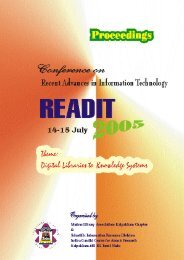READIT - 2009 - Indira Gandhi Centre for Atomic Research
READIT - 2009 - Indira Gandhi Centre for Atomic Research
READIT - 2009 - Indira Gandhi Centre for Atomic Research
You also want an ePaper? Increase the reach of your titles
YUMPU automatically turns print PDFs into web optimized ePapers that Google loves.
Proceedings of <strong>READIT</strong>-<strong>2009</strong>, Kalpakkam - 603 102, 29-30 Dec <strong>2009</strong><br />
Objective / Goal of Library<br />
Knowledge Management<br />
Library Professionals<br />
Motivation<br />
Training Programmes<br />
Career Development<br />
In<strong>for</strong>mation Users<br />
Orientation Programme<br />
Invited lectures<br />
National library Week<br />
Invited lectures to update latest technology<br />
In house training programmers<br />
Promotional policy<br />
Seminars / Work shops / Training programmes to be<br />
organized<br />
Publicity –Brochure /<br />
exhibitions-booth or stalls<br />
Interactions and<br />
collaboration<br />
with users<br />
Collaborate with nearby institutions<br />
Health Awareness programme (Yoga, General Health<br />
tips)<br />
KNOWLEDGE MANAGEMENT:<br />
Knowledge management (KM) comprises a range of practices used in an organisation to<br />
identify, create, represent, distribute and enable adoption of insights and experiences. Such<br />
insights and experiences comprise knowledge, either embodied in individuals or embedded in<br />
organisational processes or practice.<br />
Knowledge management is an integrated systematic approach to identifying, managing and<br />
sharing all of an enterprise’s in<strong>for</strong>mation assets, including databases, documents, policies, and<br />
procedures, as well as previously. Fundamentally it is about making the collective in<strong>for</strong>mation<br />
and experience of an enterprise available to individual worker.<br />
Purpose of Knowledge management:<br />
Knowledge must be managed effectively to ensure that the basic objectives <strong>for</strong> existence are<br />
attained to the greatest extent possible. Knowledge management in organizations must be<br />
considered from three perspectives with different horizons and purposes:<br />
1. Business Perspective -- focusing on why, where, and to what extent the organization must<br />
invest in or exploit knowledge. Strategies, products and services, alliances, acquisitions, or<br />
divestments should be considered from knowledge-related points of view.<br />
89

















